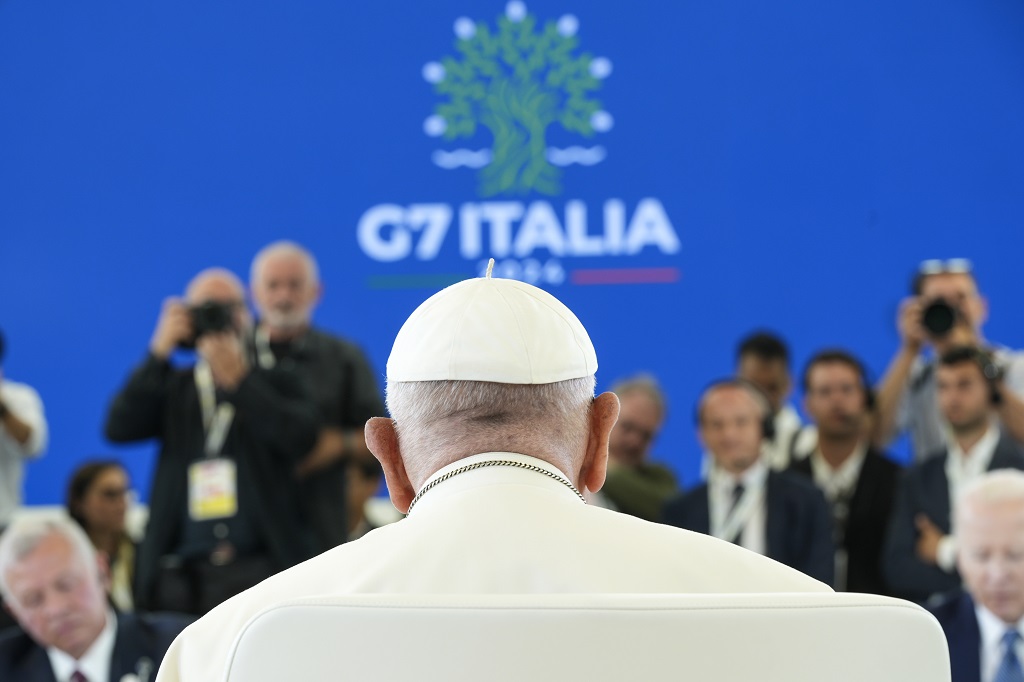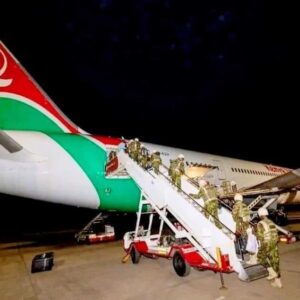Pope Francis on Friday urged leaders of the world’s rich democracies to prioritize human dignity in the development and use of artificial intelligence, warning that such powerful technology risks transforming human relationships themselves into simple algorithms.
Francis exercised his moral authority over the Group of Seven, invited by host Italy to speak in a special session at their annual summit on the perils and promise of AI. In doing so, he became the first pope to attend the G7, offering an ethical view of an issue that is increasingly on the agenda of international summits, government policies and corporate boardrooms.
Francis said politicians must take the lead in ensuring AI remains human-centered, so that decisions about when to use weapons or even less lethal tools still remain made by humans and not by machines.
“We would condemn humanity to a hopeless future if we removed people’s ability to make decisions about themselves and their lives, condemning them to depend on the choices of machines,” he said. “We must guarantee and safeguard a space of appropriate human control over the choices made by artificial intelligence programs: human dignity itself depends on it.”
Francis joins a chorus of countries and global bodies calling for stronger AI safeguards following the boom in generative artificial intelligence launched by OpenAI’s ChatGPT chatbot.
The Argentine pope used his annual peace message this year to call for an international treaty ensuring that AI is developed and used ethically. He argues that technology devoid of the human values of compassion, mercy, morality and forgiveness is too perilous to be developed unchecked.
He did not explicitly reiterate this call in his speech on Friday, but he made clear that it was up to politicians to take the lead on this issue. And he called on them to eventually ban the use of deadly autonomous weapons, commonly known as “killer robots.”
“No machine should choose to kill a human being,” he said.
Addressing the leaders around the table, he concluded: “It is up to everyone to make good use of (AI), but it is up to politics to create the conditions for such good use to be possible and successful.”
Italian Prime Minister Giorgia Meloni invited Francis and announced his participation, knowing the potential impact of his star power and moral authority on the G7. Those seated at the table seemed truly impressed, and the loud buzz in the room fell absolutely silent when Francis arrived.
“The pope is a very special celebrity,” said John Kirton, a political scientist at the University of Toronto who heads the G7 Research Group think tank.
Kirton recalled that the last summit to have had this kind of star power, which was then translated into action, was the 2005 meeting in Gleneagles, Scotland. There, world leaders decided to forgive the $40 billion in debt owed by 18 of the world’s poorest countries to the World Bank and the International Monetary Fund.
This summit was preceded by a Live 8 concert in London featuring Sting, The Who and a reformed Pink Floyd and attracted more than a million people in a show of solidarity against hunger and poverty in Africa.
“Gleneagles actually hit a home run and for some it’s one of the most successful summits,” Kirton said.
No such popular pressure is being brought to bear on G7 leaders in Italy’s Puglia region, but Francis knew he could exercise his own moral authority to renew his demands for safeguards for AI and highlight the threats for peace and the society it represents if we abandon human ethics. on the side.
“To talk about technology is to talk about what it means to be human and therefore our singular status as beings possessing both freedom and responsibility,” he said. “It means talking about ethics.”
Generative AI technology has dazzled the world with its ability to produce human-like responses, but it has also raised fears about AI safety and led to a jumble of global efforts to master.
Some worry about catastrophic but distant risks to humanity from its potential to create new biological weapons and amplify disinformation. Others worry about its effects on daily life, through algorithmic biases that lead to discrimination or AI systems that eliminate jobs.
In his peace message, Francis echoed these concerns and raised others. He said Amnesty International must be primarily concerned with ensuring fundamental human rights, promoting peace and guarding against misinformation, discrimination and distortion.
On the regulatory front, Francis will be in some ways lecturing the converted, as G7 members have been at the forefront of the debate over AI surveillance.
Japan, which held the rotating presidency of the G7 last year, launched its Hiroshima AI process to develop international guiding principles and a code of conduct for AI developers. In addition to these efforts, Prime Minister Fumio Kishida last month unveiled a framework for the global regulation of generative AI, which are systems capable of rapidly producing new text, images, video and audio in response to prompts. and orders.
The European Union was an early adopter of a far-reaching AI law, which is expected to come into force over the next two years and could serve as a global model. The law targets any AI product or service offered in the bloc’s 27 countries, with restrictions based on the level of risk they pose.
In the United States, President Joe Biden issued an executive order on AI safeguards and called for legislation to strengthen it, while some states such as California and Colorado have attempted to pass their own plans. AI law, with mixed results.
Antitrust authorities on both sides of the Atlantic have scrutinized big AI companies, including Microsoft, Amazon and OpenAI, to determine whether their dominant positions are stifling competition.
Britain launched a global dialogue on containing AI’s most extreme dangers at a summit last fall. At a follow-up meeting in Seoul, the companies pledged to develop the technology safely. France is expected to host another meeting in the series early next year. The United Nations also contributed with its first resolution on AI.
On the sidelines of his speech on AI, Francis devotes an entire day to bilateral meetings. He met with Ukrainian President Volodymyr Zelenskyy, as well as invited leaders from Algeria, Brazil, India, Kenya and Turkey. He will also meet G7 members, including Biden, Canadian Prime Minister Justin Trudeau and French President Emmanuel Macron.
___
Par NICOLE WINFIELD et KELVIN CHAN Associated Press
Chan reported from London.











